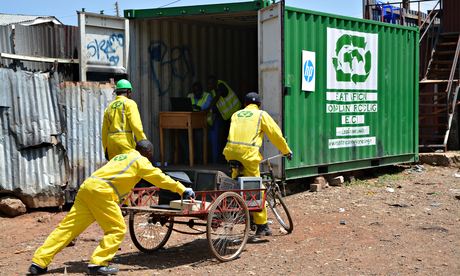Toner News Mobile › Forums › Latest Industry News › Hp introduces Large-Scale e-Waste Recycling in Africa
- This topic has 0 replies, 1 voice, and was last updated 9 years, 7 months ago by
Anonymous.
-
AuthorPosts
-
AnonymousInactiveHp introduces Large-Scale e-Waste Recycling in Africa
Collaboration between government, multinationals and individuals helped build a recycling system from scratch
Nicolette FoxToday there are more mobile phones in Africa than there are in America and they will all eventually need to be disposed of. Electronic waste is expected to top 60 million tonnes globally by 2017 – an increase of a third in five years.
This is one of 40 collection points in Hewlett-Packard's Nairobi e-waste recycling network, housed in shipping containers.
Photograph: Hewlett-PackardGet it wrong and the resulting e-waste is a toxic hazard. But get it right, and it can turn into a valuable resource.
For every one million mobile phones, you can recover significant amounts of valuable metals including 24kg of gold, 250kg of silver and nine tonnes of copper. You will even discover a few kilograms of the rare palladium. This treasure of metals could be an opportunity to turn e-waste into well-paid work.
Hewlett Packard has had an e-waste management project in Kenya since 2010, but it had much bigger ambitions. While e-waste volumes continue to grow throughout the developing world, modern recycling facilities are still rare. The company wanted to extend its work in Kenya and develop a blueprint for a sustainable recycling system that could be replicated in other developing countries.
To develop such a blueprint, Hewlett Packard knew it needed a range of partners to break down traditional barriers between the private, public and academic sectors, between bottom-of-the-pyramid individuals and multinational corporations, and between local labour and global marketplaces.
In addition to Hewlett Packard's expertise, the company brought together a group of recycling experts, financiers, regulators and academics. For recycling knowledge it partnered with the East African Compliant Recycling (EACR). For developing the regulatory environment, the Kenyan authorities came on board, while the University of Northampton delivered recycling training and awareness. A German investment organisation Deutsche Investitions – und Entwicklungsgesellschaft has experience of funding and project management in developing countries.
Their remit was to develop a system in Kenya responsibly to separate and dismantle e-waste, including domestic appliances, computers and mobile phones. In addition, the system needed to ensure that Kenyans working on the project received a fair price for the recovered materials.
The result was east Africa's first large-scale recycling facility, in Nairobi, and Kenya's first-ever registered collection network for e-waste. The micro-businesses that do the collecting receive equipment and training to ensure they meet global standards and have 40 collection points housed in shipping containers.
There is also a network of collectors who bring e-waste to the shipping containers. Critically, both the micro-businesses and individual collectors are paid fairly.
"This is the first model of its kind, not just in Africa but anywhere in the world," says Robert Truscott, chief executive of EACR. "This model is about connecting the collector to the global markets for the materials, and providing them with a fair and transparent price, to ensure they get the maximum value for the waste."
This collaboration is already having positive environmental, economic and social impacts in Kenya. It is estimated that by the end of 2014, the initiative will have created over 2,000 jobs in Kenya's e-waste management industry. The value created from reusing e-waste is shared between the recycling facility and the collection network of micro-businesses and individuals. Importantly the system allows for a transparent e-payment that passes maximum value down the chain.
The project's IT system gives the recycling facility full traceability for its flow of material and the financial transactions in the chain. Hewlett-Packard provided funding, IT equipment and IT design expertise, which used mobile phones and cloud technology.
To reduce unsafe e-waste disposal practices, Hewlett-Packard supports an information campaign and training, as well as consulting with Kenyan authorities to help develop national legislation, registration and infrastructure for responsible recycling.
The Guardian judges were impressed with the impact of Hewlett-Packard's project. They praised it for creating a network from scratch and mobilising suppliers, governments and individuals.
Hewlett-Packard's sustainability strategy dates back to 1957 when its founders first put global citizenship on its corporate agenda. Since then, it has recycled over a billion kilogrammes of IT equipment from 70 countries. In Africa, it has e-waste recycling projects in Kenya, Morocco, Nigeria and South Africa.
-
AuthorJune 5, 2014 at 11:46 AM
- You must be logged in to reply to this topic.


